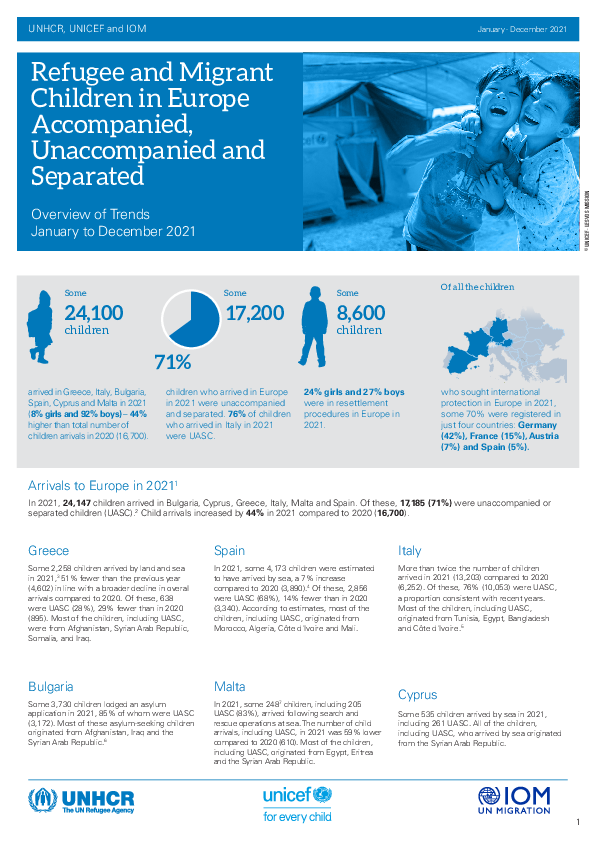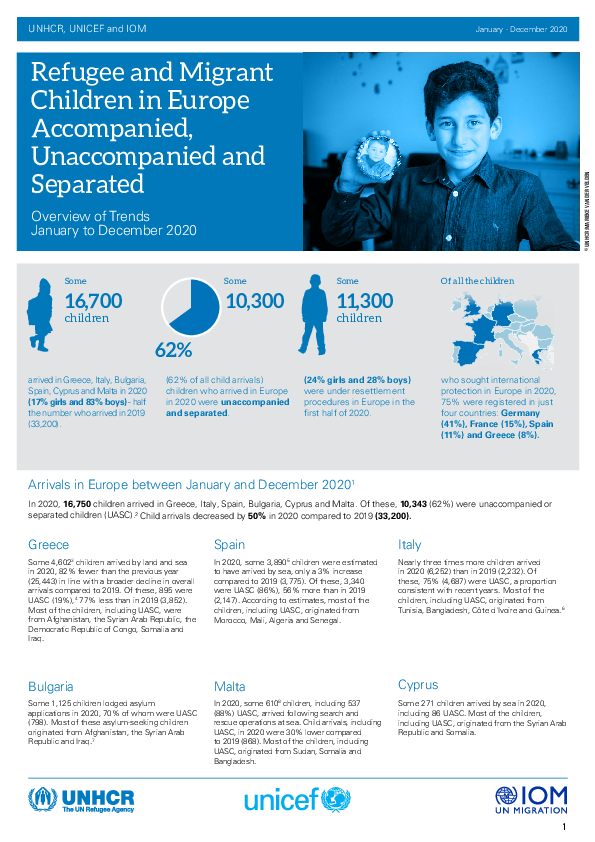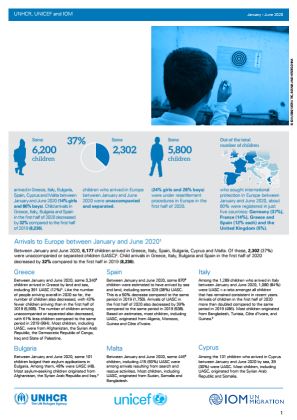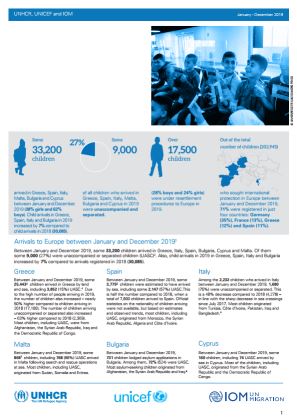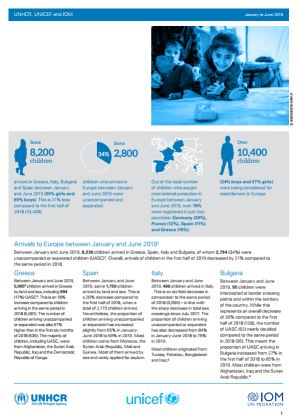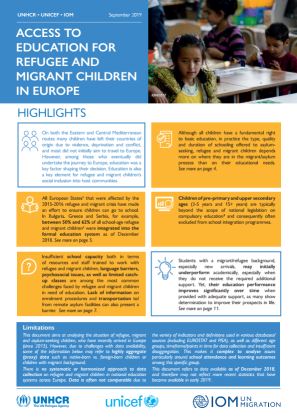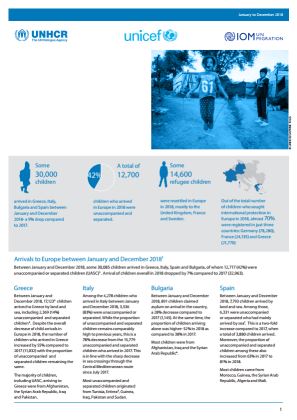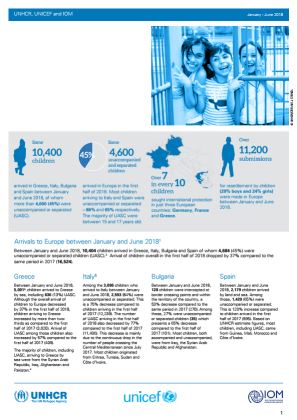-
Countries
-
Data and Analysis
-
Special Focus
-
Crisis Responses
Refugee and Migrant Children in Europe
Title Standard
Europe — Refugee and Migrant Children in Europe - Overview of Trends (January — September 2017)
Operation
Contact
DTM Mediterranean, DTMMediterranean@iom.int
Type
Component
Domain
Confidential
Region
In 2021, 24,147 children arrived in Bulgaria, Cyprus, Greece, Italy, Malta and Spain. Of these, 17,185 (71%) were unaccompanied or
separated children (UASC).
Child arrivals increased by 44% in 2021 compared to 2020 (16,700).
In 2020, 16,750 children arrived in Greece, Italy, Spain, Bulgaria, Cyprus and Malta. Of these, 10,343 (62%) were unaccompanied or separated children (UASC).
Child arrivals decreased by 50% in 2020 compared to 2019 (33,200).
Between January and June 2020, 6,177 children arrived in Greece, Italy, Spain, Bulgaria, Cyprus and Malta. Of these, 2,302 (37%) were unaccompanied or separated children (UASC). Child arrivals in Greece, Italy, Bulgaria and Spain in the first half of 2020 decreased by 32% compared to the first half in 2019 (8,236).
Impact of COVID
The impact which COVID-19 has had on entire systems and population groups of course extends to refugee and migrant children. Suspension of procedures such as registration, age assessment and asylum impacted access to services for children, including guardianship, and in some contexts access to appropriate shelter. Family reunion/reunification has been delayed with the suspension of asylum procedures, consular services in third countries and limited flight options to facilitate transfers. Physical distancing and confinement measures have exacerbated previous challenges of individual oversight and case management, effective information provision to children as well as support for caregivers and parents. Access to education has been a challenge particularly in reception facilities, as refugee and migrant children may not have the same levels of connectivity for online learning, and with crowded reception conditions being far less conducive to learning than school environments. Integration may also be hindered as regular interaction in schools and with host community children and teachers has been disrupted.
Overall, heightened risk factors such as increased poverty and food insecurity, limited access to education, disruption of peer and social support networks for children/caregivers, as well as community and social support services, have had a detrimental effect on mental health and psycho-social well-being, and exacerbated the risk of violence, abuse and neglect for children, both unaccompanied and within families.
Some 33,200 children arrived in Greece, Spain, Italy, Malta, Bulgaria and Cyprus between January and December 2019 (38% girls and 62% boys). Child arrivals in Greece, Spain, Italy and Bulgaria in 2019 increased by 7% compared to child arrivals in 2018 (30,085). Some 9,000 of all children who arrived in Greece, Spain, Italy, Malta, Bulgaria and Cyprus in 2019 were unaccompanied and separated. Over 17,500 children 28% boys and 24% girls) were under resettlement procedures to Europe in 2019. Out of the total number of children (202,945) who sought international protection in Europe between January and December 2019, 71% were registered in just four countries: Germany (35%), France (13%), Greece (12%) and Spain (11%).
Some 8,200 children arrived in Greece, Italy, Bulgaria and Spain between January and June 2019 (35% girls and 65% boys). This is 21% less compared to the first half of 2018 (10,400). Some 2,800 children who arrived in Europe between January and June 2019 were unaccompanied and separated. Out of the total number of children who sought international protection in Europe between January and June 2019, over 70% were registered in just four countries: Germany (39%), France (12%), Spain (11%) and Greece (10%). Over 10,400 children (24% boys and 27% girls) were being considered for resettlement in Europe.
IOM, the International Organization for Migration, UNHCR, the UN Refugee Agency and UNICEF, the United Nations Children’s Fund detail the obstacles children and adolescents born outside Europe face when trying to access education in Europe.
Currently the number of children and adolescents born outside Europe (including recently arrived refugee and migrant children) who leave school early is nearly twice as high compared to native-born children. Migrant children also have lower learning outcomes when they are not given adequate support. For example, around 3 in 4 native-born students attain proficiency in science, reading and math but only 3 in 5 students with a migrant background do.
Among the key challenges highlighted in the report are:
- Insufficient financial resources
- Not enough school spaces or teachers trained to work with refugee and migrant children
- Language barriers
- A lack of psychosocial support and limited catch-up classes. The latter are vital for children who have missed extended periods of schooling or have come from different education systems.
Children of pre-primary age (3 to 5 years old) and upper secondary age (15 years and older) are particularly vulnerable to being out of school, as they are often beyond the scope of national legislation on compulsory education.
To help States tackle these challenges and address key data gaps, the paper gives examples of good and promising practices in education across Europe and makes a series of recommendations.
Some 30,000 children arrived in Greece, Italy, Bulgaria and Spain between January and December 2018, a 9 per cent drop compared to 2017. A total of 12,700 children were registered as unaccompanied and separated. Estimated 14,600 refugee children were resettled in Europe in 2018, mostly to the United Kingdom, France and Sweden. Out of the total number of children who sought international in Europe in 2018, almost 70% were registered in just three countries: Germany (78,280), France (24,135) and Greece (21,770).
Over 16,500 children arrived in Greece, Italy, Bulgaria and Spain in the first six months of 2017, of whom more than 11,900 (72%) were unaccompanied and separated children (UASC). Arrivals in the second quarter of 2017 were more than double the first quarter (11,100 compared to 5,400). A total of 11,400 unaccompanied and separated children arrived. 7,600 children were relocated through the EU relocation scheme from Greece and Italy.
Some 10,400 children arrived in Greece, Italy, Bulgaria and Spain between January and June 2018, of whom more than 4,600 (45%) were unaccompanied and separated (UASC). Most children arriving to Italy and Spain were unaccompanied and separated 86% and 65% respectively. The majority of UASC were between 15 and 17 years old. Over 7 in every 10 children sought international protection in just three European countries: Germany, France and Greece. Over 11,200 submissions for resettlement by children (29% boys and 24% girls) were made in Europe between January and June 2018.
